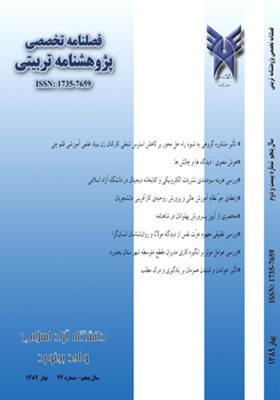بررسی تطبیقی مفهوم عزّت نفس از دیدگاه مولانا و روانشناسان انسانگرا
محورهای موضوعی : علوم تربیتی
کلید واژه: مثنوی, مولانا, عزت نفس, ارزش آدمی, روانشناسان انسانگرا,
چکیده مقاله :
مولانا جلاالدین بلخی، شاعر و عارف بلندپایة ایرانی، در قرن هفتم هجری یعنی قرنها پیش از پیدایش علم روانشناسی، در آثار ماندگار خود، به ویژه در مثنوی معنوی، الگوی دقیق و همه جانبه و سیمای روشنی از شخصیت سالم انسان ارائه نمودهاست. آراء او به عنوان یک انسان شناس مسلمان و پرورش یافته در قلمرو فرهنگ اسلامی و ایرانی در بسیاری از زمینهها، شباهتهای حیرتانگیزی با افکار روانشناسان انسانگرای معاصر دارد. هر چند، تفاوتهای بنیادین در محتوای اندیشههای آنان به چشم میخورد. مقالة حاضر دیدگاههای مولانا و روانشناسان یاد شده را دربارة مفهوم و کارکرد عزت نفس مورد مقایسه قرار داده و وجوه تشابه آنها را باز نموده است.
Mowlana, Jalal-al-Din Mohammad Balkhi(Romy), the great and prominent Iranian poet and mystic put forward a clear, precise and all-inclusive model of healthy human personality, in his everlasting works especially Mathnavi Manavi in 7th Hejira Century before the advent of the psychology science. His views, as a Moslem anthropologist brought up in an Islamic and Iranian culture, are to a large extent similar to those of the contemporary humanistic psychologists. Although there seem to exist some fundamental differences in their thoughts. The present article compares Mowlana's views with those of humanistic psychologists regarding the concept and function of self-esteem and clarifies the common areas and similarities

